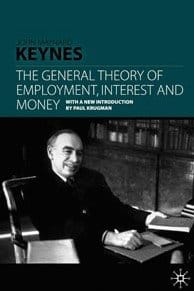
The General Theory of Employment, Interest, and Money by John Maynard Keynes is here presented as the third in our mini-series of major economic-philosophical works, the two others being Adam Smiths’s Wealth of Nations and Karl Marx’s Capital. Keynes’s work is the most recent, published in 1936, established economics as a modern scientific field and created a shift in the way societies, markets, companies, and even households thought about economics.
The theory describes how crises, booms, and unemployment are inevitable aspects of market economies.
Theory of Employment is not a critique of capitalism
What Keynes points out, is that the free hand of the market does not necessarily provide stability and fairness. This led many to believe that Keynes’s work was a critique of capitalism. It was not, even though he strongly advocates for economic intervention, his ideas were rather a showdown with the mainstream misinterpretations of economics at the time. Keynes’s economic theories became in the years are after the publication of The General Theory of Employment, Interest, and Money implemented in national policies all over the world and played a major role in formulating wartime and post-war economic policies.
Download the free PDF e-book here:
 The General Theory of Employment, Interest, and Money by John Maynard Keynes
The General Theory of Employment, Interest, and Money by John Maynard Keynes

